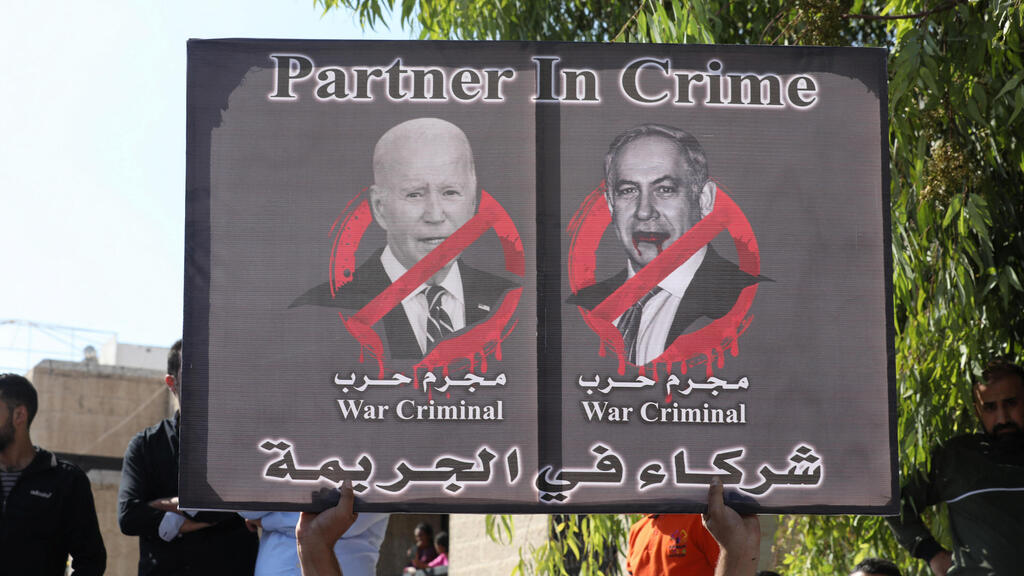The Egyptian-Israeli peace treaty may be invalid if U.S. President Donald Trump carries out his threats to end American aid to Egypt, diplomatic sources in Cairo were quoted as saying in an article to the Qatari Al Araby al-Jadeen newspaper on Tuesday.
The sources said the planned meeting in Washington between Egyptian President Abdel Fattah el-Sisi and Trump has been suspended indefinitely amid the worse crisis in U.S.-Egypt relations in three decades and Cairo's rejection of Trump's plan to remove Palestinians from Gaza while he rebuilds the Strip and settle them in neighboring Arab countries.
4 View gallery


Jordan and Egypt oppose Trump's post-war Gaza plan
(Photo: Omar AL-QATTAA / AFP, Sean Gallup / Getty Images, AP / Carlos Osorio, Reuters / Saudi Press Agency Handout / Reuters)
Trump says will own Gaza
(Fox News)
U.S. President Donald Trump's remarks late Monday threatening to halt American aid to Egypt and Jordan if they refuse to accept Palestinian refugees, mark a turning point in the Palestinian issue, linking it to the longstanding relationships these countries have with the U.S.
In January, the Trump administration froze all international U.S. aid for 85 days for "review," but exempted Israel and Egypt due to the ongoing war.
Other sources told Saudi television network Al-Arabiya that "Egypt has decided to take precautions against any potential halt of U.S. aid and has prepared emergency plans to deal with U.S. pressure regarding the displacement issue."
Egypt, the third-largest recipient of U.S. aid after Israel and Jordan, would be heavily impacted if the aid is cut off. According to Al-Masry Al-Youm, U.S. aid to Egypt is estimated at $2.1 billion, including $815 million in economic aid, with the rest allocated for military aid. The outlet also noted that the U.S. has often used aid as leverage against Egypt.
The London-based Arab outlet Asharq Al-Awsat said in an article that Egypt’s exemption from the aid freeze "was tied to its central role in Middle East security and the peace agreement with Israel." Experts cited by the paper affirmed that the exemption "would certainly be appreciated by Egyptian authorities, strengthening regional cooperation." However, these assumptions are now in question after Trump’s recent remarks.
While Egypt and Israel were exempted from the freeze, U.S. aid to Jordan, which heavily relies on foreign aid, was suspended. U.S. assistance to Jordan, valued at $1.4 billion, is crucial for the country’s economy, funding development programs and maintaining stability.
Prior to the freeze, Jordan was expected to receive $2.1 billion in U.S. aid by 2025. King Abdullah II of Jordan is scheduled to meet Trump in Washington later on Tuesday.
A few days after the announcement of the suspension of aid, King Abdullah visited Brussels, where he signed a comprehensive strategic partnership agreement with the European Union. The agreement focuses on political, security, economic, trade, investment and refugee issues and includes efforts to combat drug and arms smuggling into Jordan.
Jordan and the U.S. share a long-standing relationship based on mutual interests, including cooperation on Islamic terrorism and international security. Jordan is a key U.S. ally, with American troops stationed there and U.S. weapons stored in the country.
Get the Ynetnews app on your smartphone: Google Play: https://bit.ly/4eJ37pE | Apple App Store: https://bit.ly/3ZL7iNv
Around 3,000 American soldiers are based in Jordan, operating under a secret agreement allowing access to 12 key Jordanian military bases. Jordan, not a NATO member, also conducts joint military training with other countries, including Israel.
"There have been crises in the past, both between Israel and Jordan and between Jordan and the U.S," Professor Ronen Yitzhak, head of the Middle East Studies department at the Western Galilee College and researcher at Tel Aviv University, said.
"After 1967, King Hussein claimed the U.S. was pro-Israel and didn’t pressure Israel to withdraw from the West Bank, but relations always remained behind the scenes." Despite this, he stressed the strong anti-Western sentiment in Jordanian public opinion, which strongly supports Palestinians.
A recent Jordanian nationwide poll expressed support for King Abdullah’s stance against "the expulsion of Palestinians from Gaza." The king has backing from Arab states and popular support against Trump’s plan.
"Jordan sometimes pursues an independent policy, and Abdullah is not an American puppet," Yitzhak added. "The relationship between Jordan and the U.S. is not as it once was. There have been past tensions, such as after the Gulf War. What’s unclear now is Israel’s silence, as it should understand the implications of weakening Jordan’s government." Yitzhak said he found it hard to believe Trump's threat would lead to aid completely being cut off.
Both Egypt and Jordan have expressed opposition to the "expulsion of Palestinians from Gaza" due to concerns over displaced people crossing into their territories.
Egyptian officials said that "any displacement would end the Palestinian issue," while both Cairo and Amman have voiced support for a two-state solution and the establishment of a Palestinian state with East Jerusalem as its capital.
These countries view the issue as fundamental and economic threats are unlikely to change their position, but may lead to renewed preparations and alternative funding solutions. If Trump’s threats are carried out, they could lead to new alliances in the region that may not favor Israel.
Egyptian Foreign Minister Sameh Shoukry told U.S. Secretary of State Marco Rubio during a recent visit that "Arab countries support the Palestinians and reject Trump’s plan." He stressed the importance of rebuilding Gaza while Palestinians remain there.
An official from another Arab state told CNN anonymously that "it’s still unclear" whether the U.S. is actively working on the details of the plan to move Gaza’s residents, noting that Arab officials will discuss Gaza’s future with Trump.








